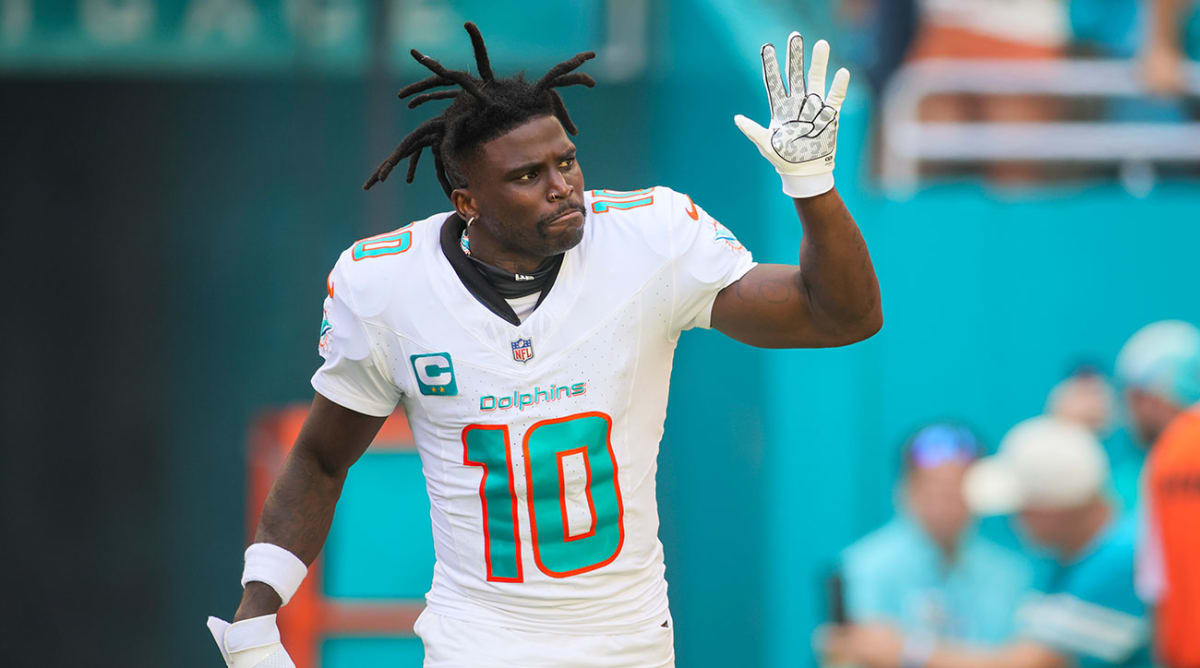First things first: Let’s not pick on the poor soul managing the NFL’s UK X (formerly Twitter) account, who posted a video of Tyreek Hill borrowing a cell phone for use as a prop in his post-touchdown backflip, only to have it deleted seconds later because it is no doubt a finable offense. I can imagine that, if it were my job to recognize and share engaging moments in a football game live as they’re happening, this would be as elementary as stop, drop and roll when on fire. (Plus, in the person’s defense, NFL partner CBS used the backflip portion of the celebration in its outro.)
This, to a professional football social media person, is the content equivalent of a new baby photo. Just think of the numbers that’ll do! It’s a no-brainer (save for, you know, your child’s face becoming a cyberspace mold for AI infant products).

Sam Navarro/USA TODAY Sports
My issue, and our collective issue, should be the consistent mental tug of war players are put through on an everyday basis as it pertains to what they mean and who they are. Not long ago, the NFL became far more of a content mill than a professional sporting organization. Players are not thought of primarily as workers, but objects in our fantasy football lives, our video game lives and our celebrity gawking lives. They are the grist for a product that has Taylor Swiftian aspirations, which means selling not only the bodies of its stars but their personalities, their likes and their circumstances.
Forever, these players have been the catalyst for our everyman complaints; a way for us to gain a quick fix of moral superiority on a Sunday when we tap the person on the barstool next to us and say, “Can you believe that guy is complaining about something, given how much money he makes?” Now, they are our entertainment, our punching bags, our role models, our product pitch men and everything in between.
They are told that the only way they can survive in the wildly saturated field of post-NFL career analysis is by standing out. They are left to their own devices as to how far, exactly, they are allowed to go.
Hill, after the game, said of the harmless gesture: “I know the NFL is going to fine me for it. It’s worth it, though, Every time I step on the field I’m trying to make it memorable.”
THIS IS WORTH THE FINE 🔥🔥🔥 https://t.co/cs5mWoWPQk pic.twitter.com/Tx6Uv0DatY
— Robert Griffin III (@RGIII) October 15, 2023
The NFL is going to fine Hill (he also drew a 15-yard penalty), but the league will also reap the benefit of a week’s worth of discussion about fining him. This is another perfect example of a self-promotional cycle that flows in a circular pattern, from tributary to body of water and back again. Not so much a snake eating its own body, but a snake figuring out a way to keep creating more snakes.
The NFL can pat the old-timers on the head and assure them that the integrity and professionalism of the game will be maintained—that their beloved football isn’t turning into World Wrestling Entertainment—while simultaneously stoking the arm of the operation that very much wants to turn it into World Wrestling Entertainment.
Personally, I think all rules should be viewed through the lens of intent (as I wrote about DJ Moore’s nonsensical celebration penalty last season). Obviously, for safety reasons, you have to ban the very broad idea of a player being able to access a foreign tool on the sidelines. You also have to ban the coordination of such an act. There are a million reasons why you wouldn’t want Hill to be able to access a scythe or a katana sword. But this was clearly an innocent and harmless gesture aimed at doing exactly what Hill said he was trying to do: make the moment memorable.
The NFL owns that moment. The moment has been tweeted, deleted and leaked anyway, more available online than your neighbor's social security number. Now the league will collect from Hill and punish him, all while enjoying the goodwill created from a player willing to endure such fines to make the moment special for those in attendance, and those along for the ride via cell phone video.







